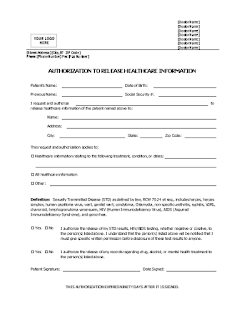Medical Confidentiality
We've all been there, right? Faced with a consent form, or authorization form (or, frankly, any form) that's considered a formality. Boilerplate language, cut and pasted from a template. You might scan it, but doing so doesn't really give you any new information. You sign it, and move on. Efficiency is the name of the game.
A standard medical release form.
Medical information release forms are a fairly standard requirement for almost any cross-communication between doctors or healthcare providers in different systems, specialties or regions. And why wouldn't you sign it? I'm all for better communication among my healthcare team; the care I receive will be better the more they all talk to and learn form each other about my ailments. Putting barriers in their way can't help. And all medical practices have rigorous confidentiality and data protection systems in place. I am not one for the conspiracy theories that say medical offices are spraying your personal medical history across the internet. I'm not really worried about leaks, or hacks, or people with nefarious intentions gaining access to my blood pressure readings.
But medical information release forms aren't just found in hospitals and medical clinics, for sharing information amongst HCPs. They're found everywhere - for employment, for access to certain kinds of care or funding, for social assistance (for anyone in your family), during adoption or fostering assessments, for some private schools... the list of non-medical people that may want or need to access your private medical information is, to say the least, unsettling.
Who needs to know what?
Here's an example. You're applying to become a foster parent. You fill in the many, many forms required to vet and assess you. This includes rigorous analysis of your background, family, lifestyle, financial situation, career, personal relationships, and health. You have to answer the questions. They need to be verified by a certified social worker. And then they need to be verified by your doctor, or, if applicable doctors. Every doctor that you have seen. No matter what for, or how long ago - if it's on your medical record, your PCP has an obligation to mention it on their assessment (which requires filling out a long form, for which you need to make a special appointment and probably pay a fee), and then the social worker is obligated to follow up with each individual doctor, therapist and HCP mentioned.
For a lot of chronic pain patients, chronic illness warriors, or, you know, people who have been alive for any length of time, this is a LOT of people. A lot of release forms you have to sign, giving that social worker or agency access to every scrap of medical record or document that almost anyone may have kept about you. And that's the best case scenario. Cos if your PCP mentions someone who then can't provide documentation regarding their treatment of you, that's a red flag - an unclosed bit of business that may come back to haunt you.
If this seems like a lot of paperwork stuff that's simply out of your hands - it is. Most people typically don't bother accessing their own medical records. Many people will have multiple records, because of multiple HCPs and as a result of moving to a new area. Keeping track of all of the potential records and files others may keep on you probably seems like an arduous waste of time, even if it were completely possible (and here's a fun tip: it isn't).
So what can you do? You're a pawn in the information system. Highly confidential data about you is out there, on paper and digital records across almost any area that you've lived (and, in the instance of large hospital chains, saved in a massive centralized database), and almost anyone at almost any point in your life can ask you to sign a seemingly innocuous bit of paper that grants them access to this data.
So do you sign?
I had not thought about that question before today, because I always automatically have. The consequences of not signing seemed greater than the perceived benefit of abstaining. But when the data relates to something as misunderstood and demonized as chronic pain, the trade-off becomes much murkier. Not everyone reading those files will have the same reaction, or take away the same understanding of your medical condition. They might look at your prescription lists and make assumptions about you, your capabilities, your issues, your lifestyle. That might affect how they treat you, or whether they allow you to work, foster, receive assistance, whatever. So here's a more important question:
Do you know what happens if you refuse to sign?
And I guess that's the point: you're not being presented with a choice about the distribution of your medical information, you're being presented with an ultimatum. Participate, or disengage entirely. Thanks healthcare, you're really empowering us with that one.


Comments
Post a Comment